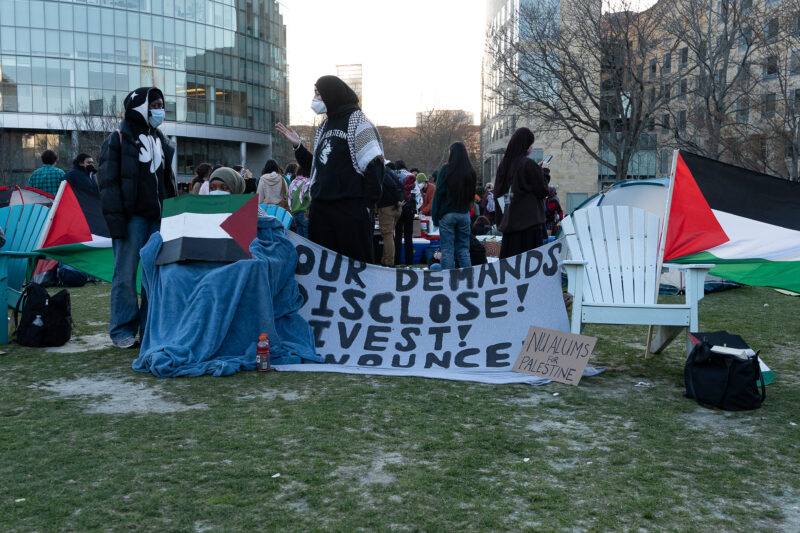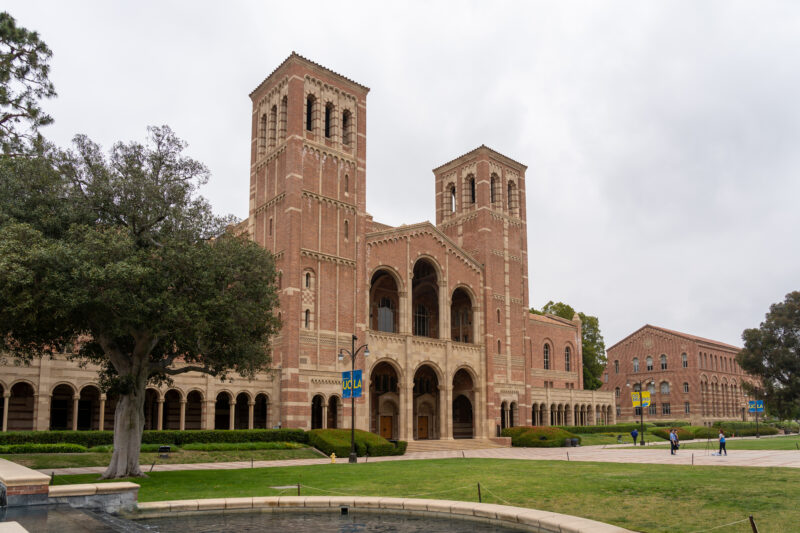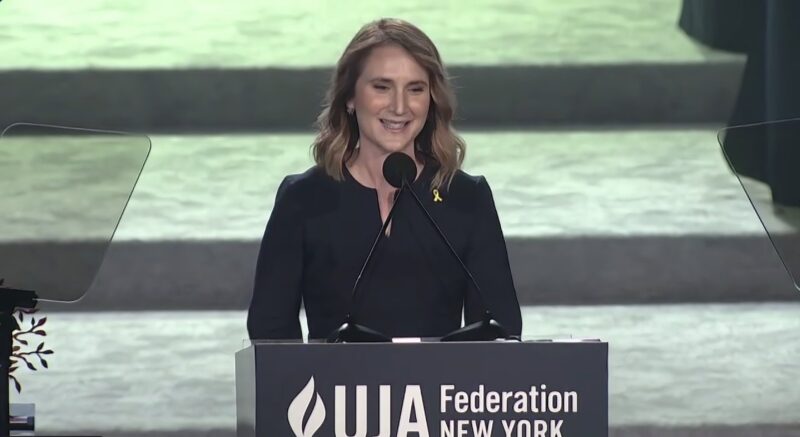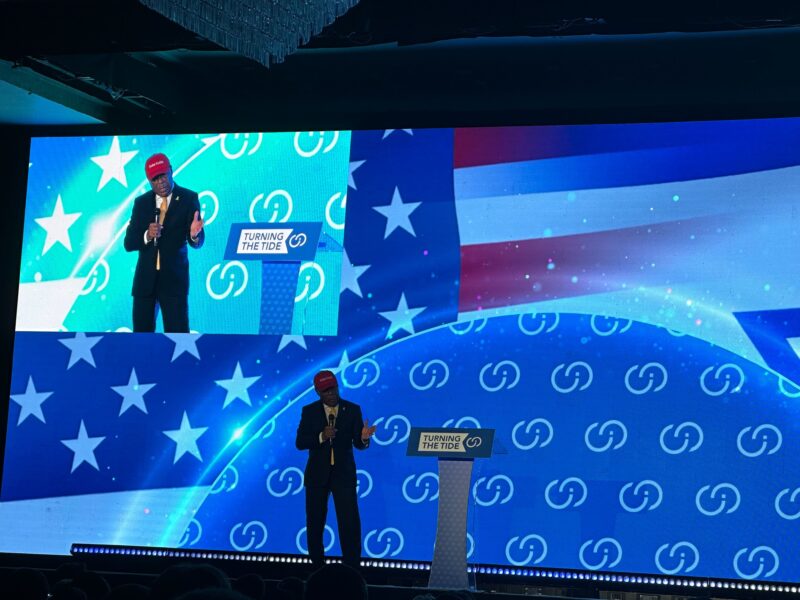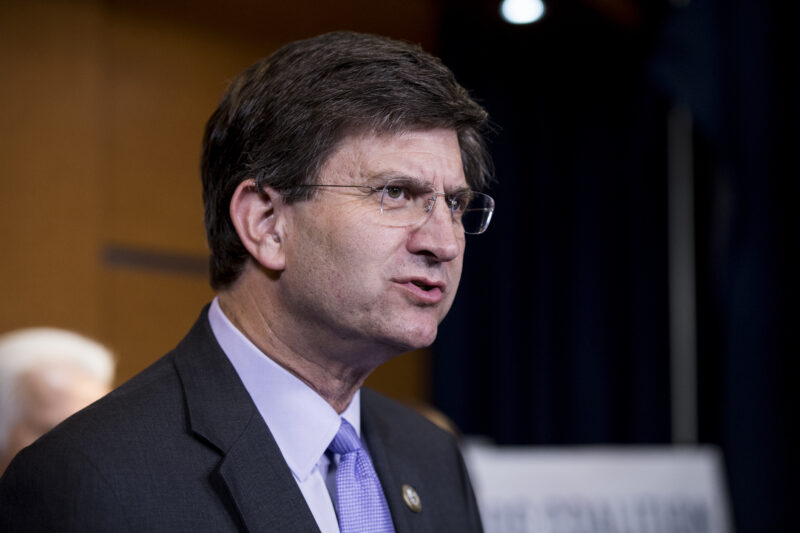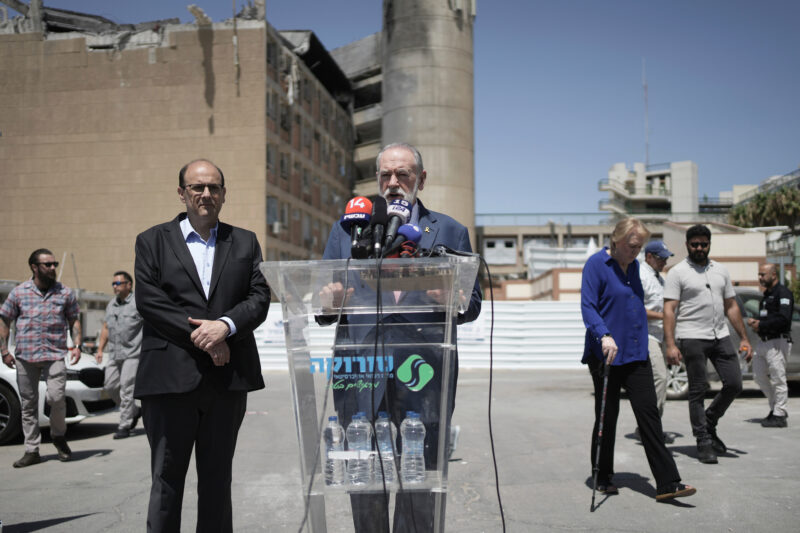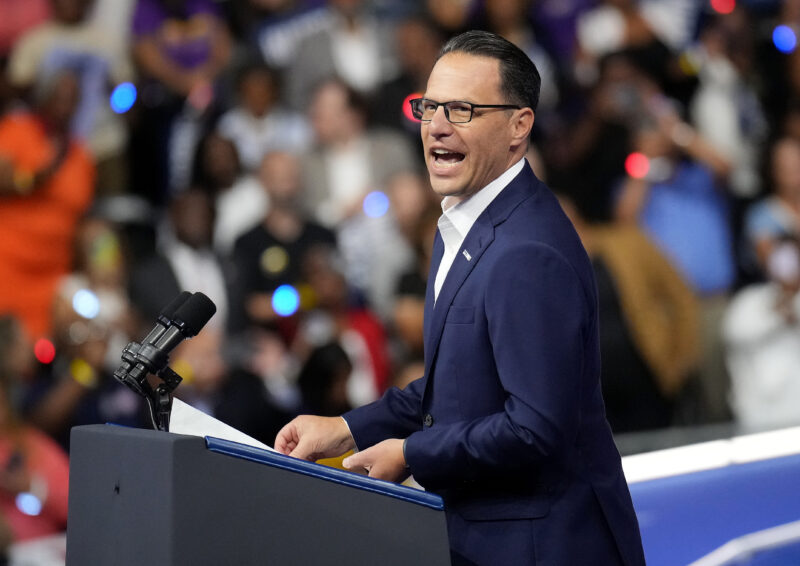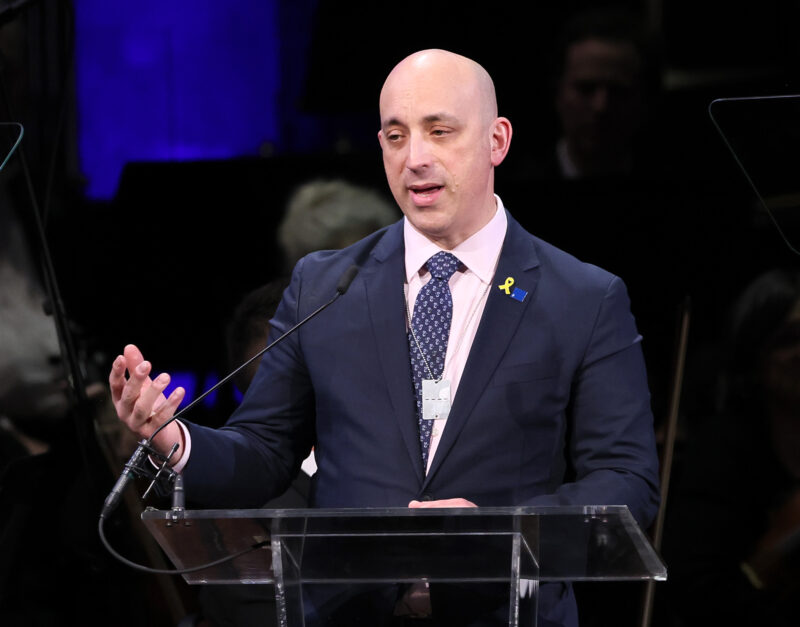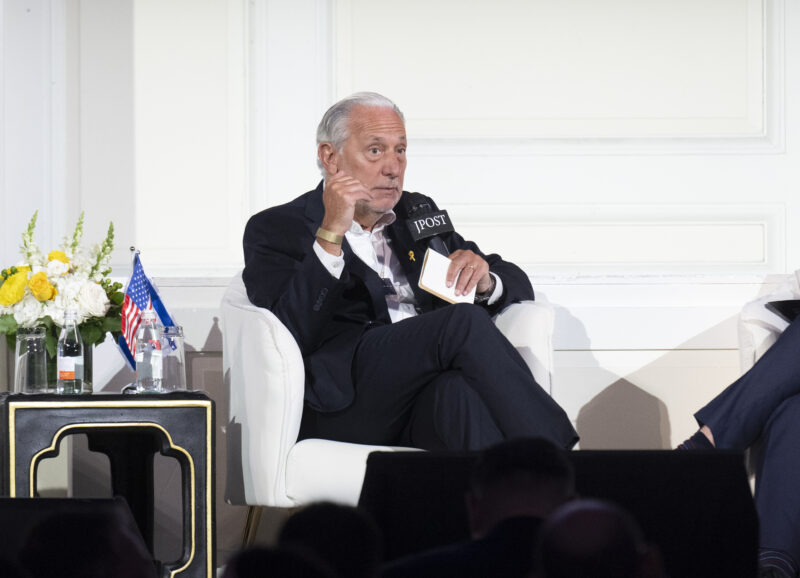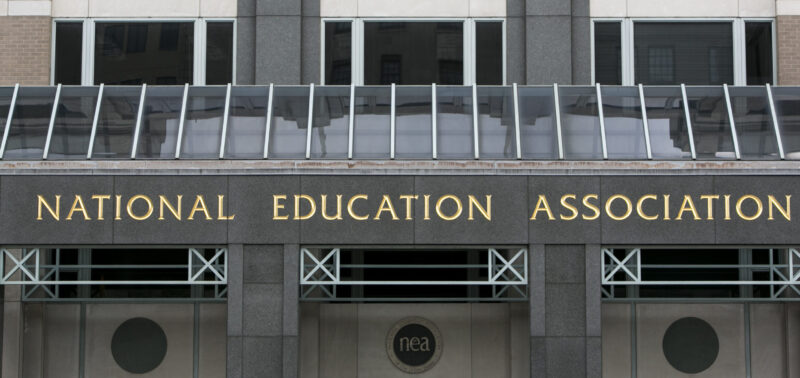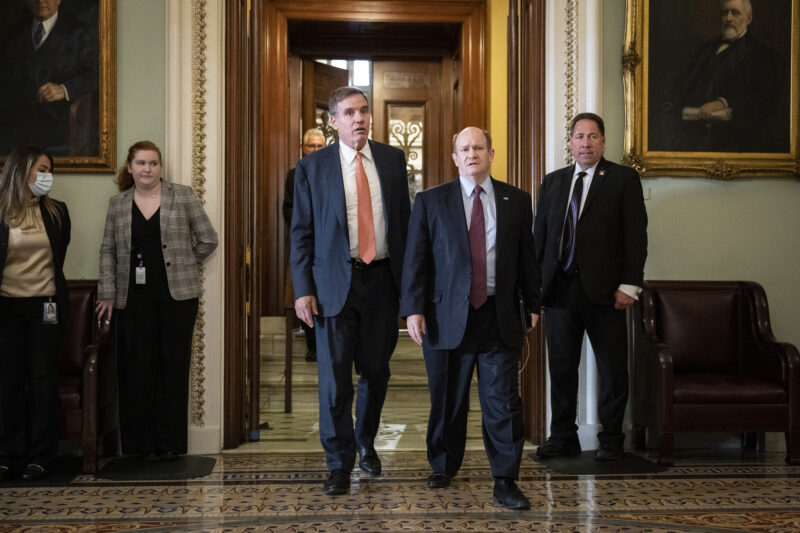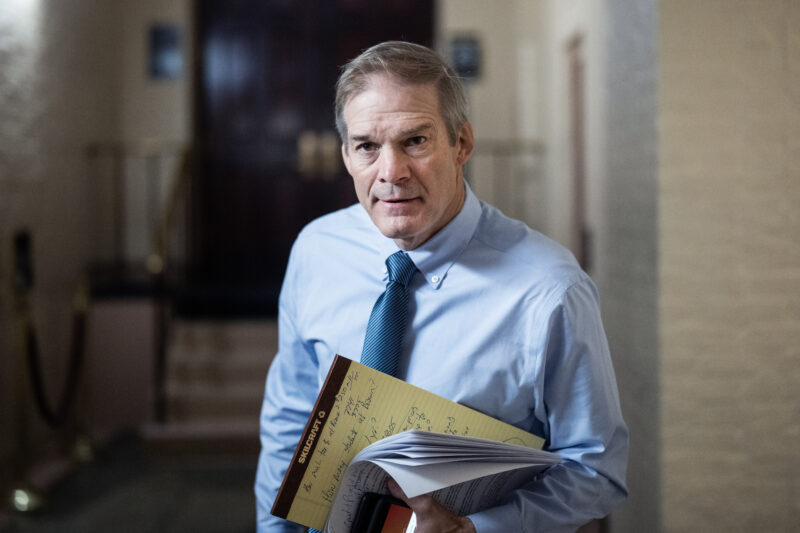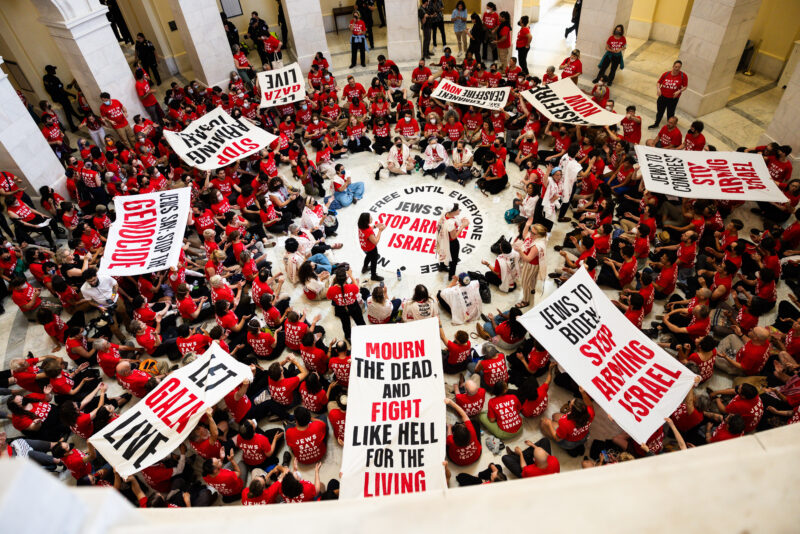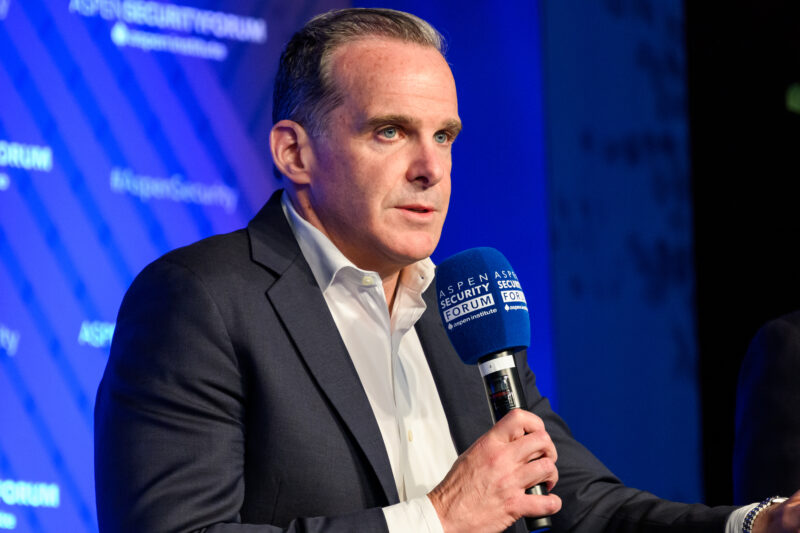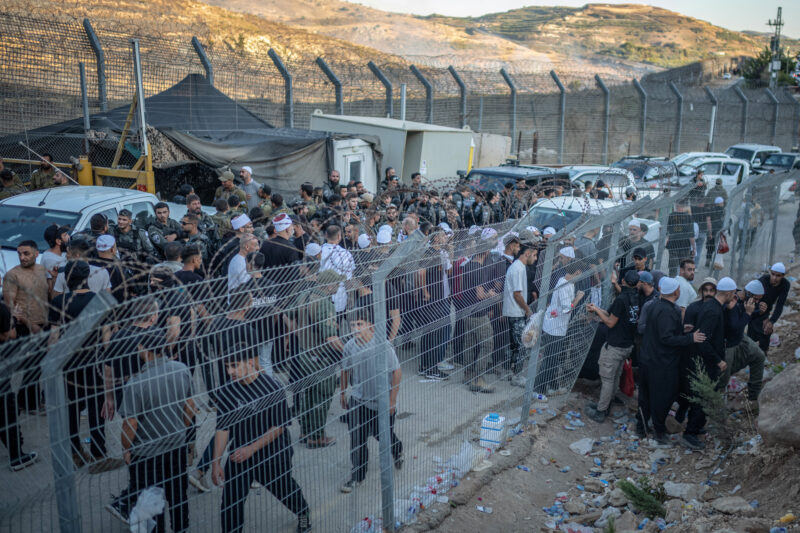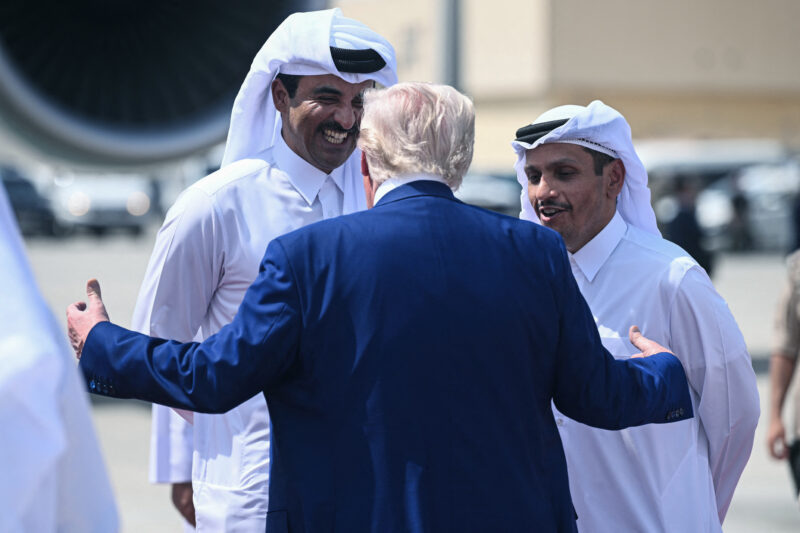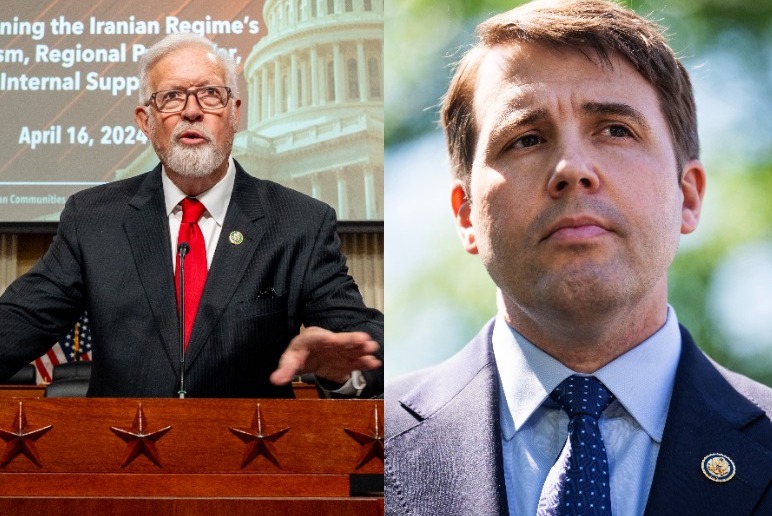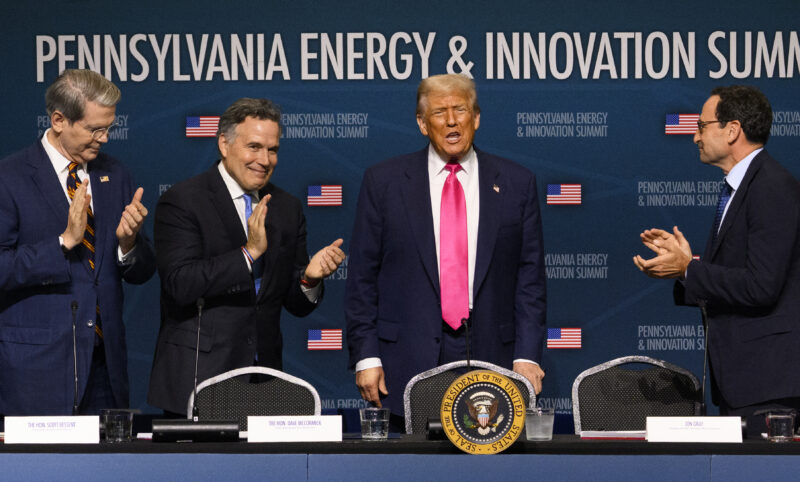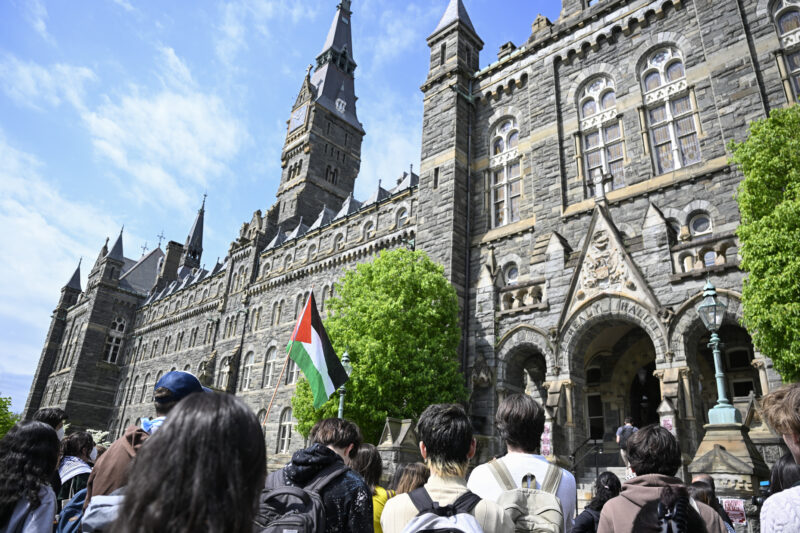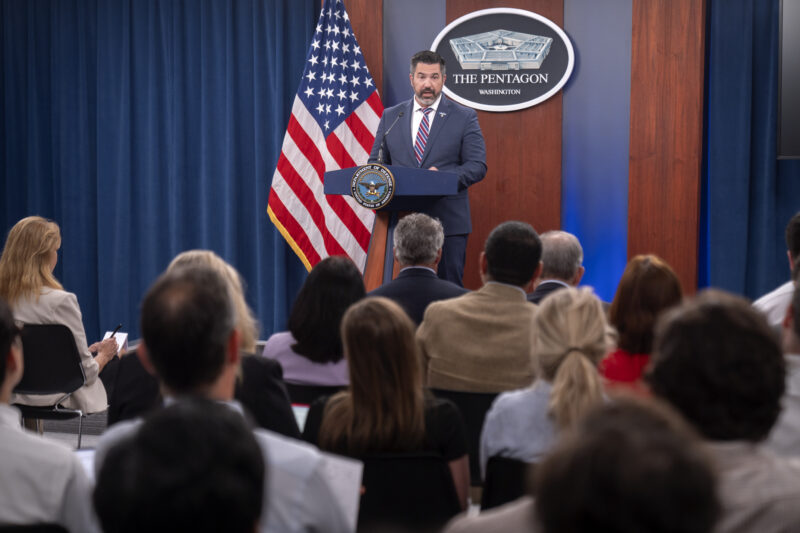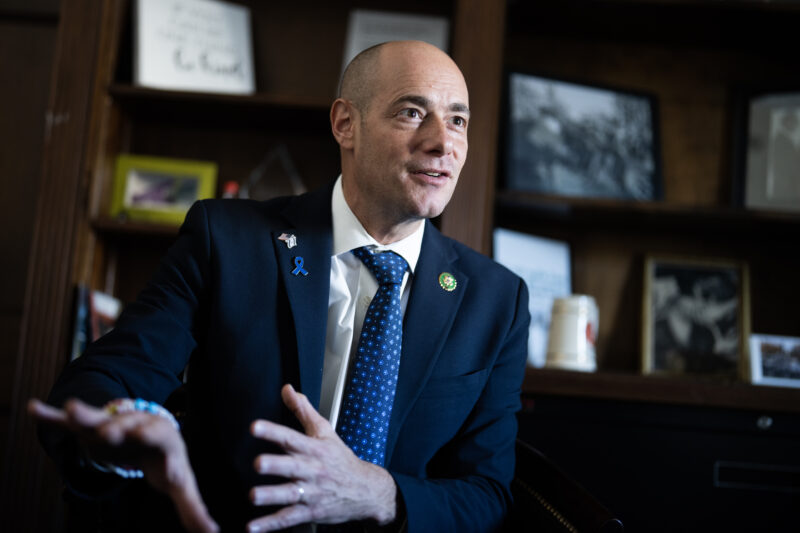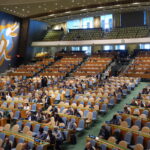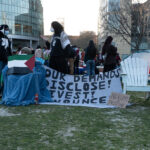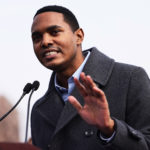Gorka also discussed efforts to designate the Muslim Brotherhood as a terrorist organization and end Qatari and Turkish support for Hamas
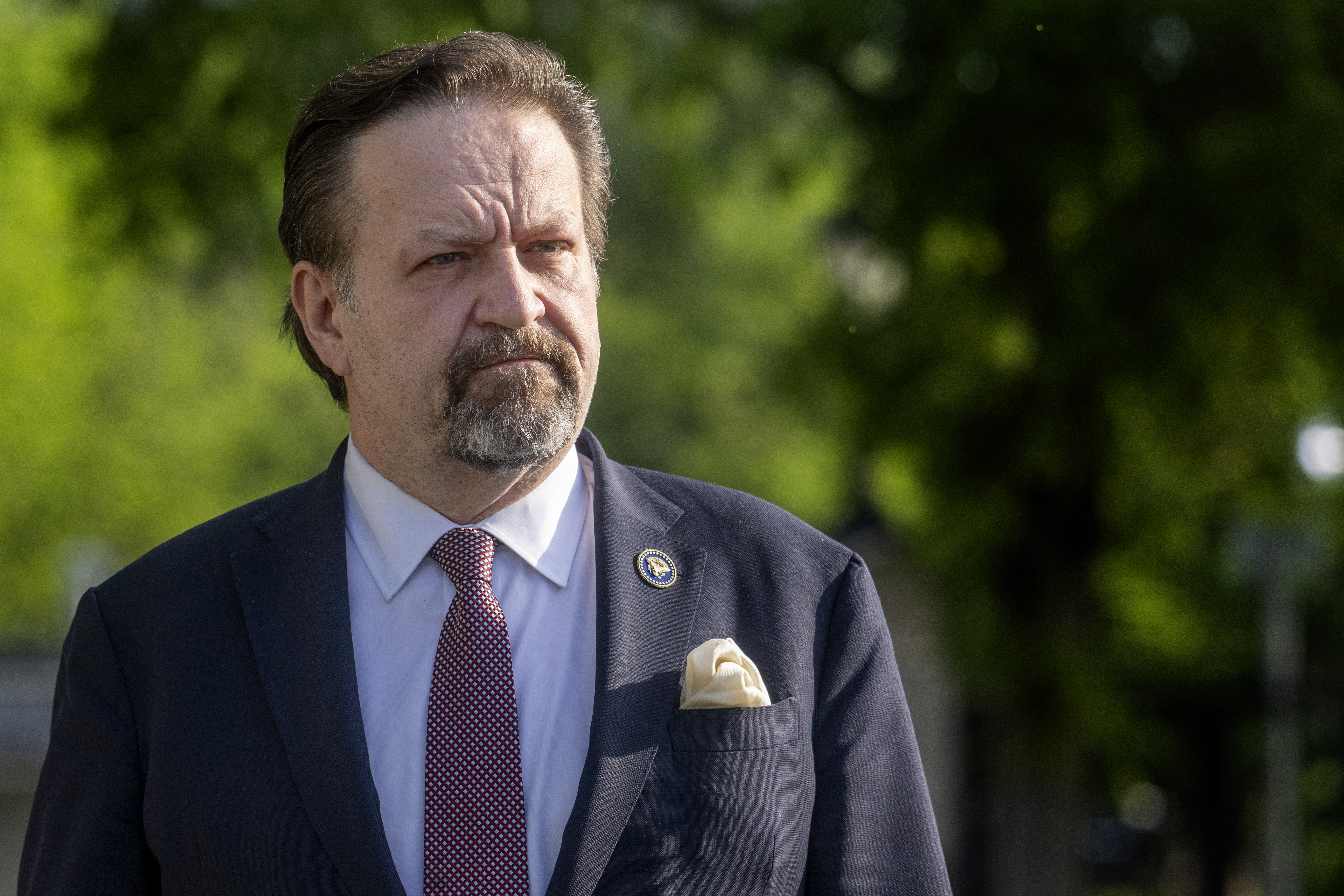
JIM WATSON/AFP via Getty Images
U.S. Senior Director for Counterterrorism Sebastian Gorka walks outside the White House in Washington, DC, on May 7, 2025.
Sebastian Gorka, the White House senior director for counterterrorism and a deputy assistant to the president, said Wednesday at the Foundation for Defense of Democracies that the U.S. is not seeking regime change in Iran, but will maintain its maximum-pressure campaign on Tehran.
Gorka also said that he supports efforts to designate the Muslim Brotherhood as a terrorist organization, suggested that he’s pursuing efforts to convince Qatar and Turkey to cut ties with Hamas and said the U.S. wants to see Syrian minority groups come to the table and join with the new Syrian government.
He said that the Trump administration views Iran as the paramount threat and focus in the Middle East, and that its strategy toward Iran is “max pressure, no regime change,” with the goal of stopping Iran’s nuclear program and ending its support for terrorist proxies.
“We are not in the business of deploying the 82nd Airborne to do regime changes anywhere. We don’t believe in that,” Gorka said.
In the long term, he added, “we would like the people of Persia, including the minorities of Persia, to eventually liberate themselves.”
Trump had publicly floated the possibility of regime change in Iran after the U.S. strikes on the country last month, but subsequently said he does not seek regime change. Some administration officials had also floated the idea of sanctions relief for Iran.
Gorka said he backs efforts to designate the Muslim Brotherhood as a terrorist organization, describing the group as the “granddaddy” of all of the terrorist organizations that have attacked the United States and its allies for decades.
“If we can designate, as we have, Hamas, which in its founding charter from 1984 says, ‘We are a chapter of the Muslim Brotherhood,’ then why haven’t we designated the Brotherhood itself?”
“So what I’ll say right now,” Gorka said, clearing his throat, is, “I like the idea,” he finished in a whisper.
Asked by Jewish Insider about whether the administration is working to end Turkey and Qatar’s sponsorship of Hamas, he said that he is “imminently traveling to that part of the world, so that should tell you something.”
He added that Turkey is an “important nation, it’s a geopolitical nation, it has a role to play with us as a NATO nation, but there are things I will be discussing with Ankara that I find leave me with a sense of unease,” including the Turkish government’s relationship with Hamas as well as reports that ISIS terrorists have been moving through Turkey.
“There has to be a balance between their conceptualization of the PKK threat,” Gorka said, referring to the Kurdish militant group, “and threats that we share, such as ISIS. I think that’s where the rebalance has to come.”
“With regards to Qatar, Qatar has … a very simple choice it has to make. Do you give any kind of succor to those who do not help in the stabilization of the region? That’s all I’m going to say,” he continued.
In Gaza, Gorka said that there “are a lot of good things happening at a tactical and operational level” on the ground, in that the U.S. is working to train anti-Hamas police and security units and that those units are “working quite closely with Israel.”
But, he said, “as far as I’m concerned, none of that goes anywhere until the political leadership changes,” saying that the “cultural issue” of widespread support in Gaza for Hamas and the Oct. 7, 2023, attacks on Israel is a problem that cannot be solved by a police force. “We need some brave men and women to say, ‘I am here to help fix Gaza.’”
Gorka framed President Donald Trump’s proposal for the U.S. to take over Gaza and relocate the Palestinian population as a negotiating tactic to motivate Middle Eastern countries to step up to take responsibility and invest in Gaza — though that investment hasn’t yet come to fruition.
Gorka, who said he regularly watched videos of ISIS and Al-Qaida’s brutal torture and murder of their victims, described footage of the atrocities committed by Hamas on Oct. 7 as far beyond anything he had ever seen before. “Nothing I’d watched in my two decades prepared me for what I saw that day.”
“I praise the government of Israel. I praise the IDF because what they have done in response is a redrawing of the map of the Middle East that will change your politics for at least a century,” Gorka said. “One of the greatest things they have done is to ensure that the strategic threat of Iran is now incapable of resupplying its proxies in the territory of Syria. God bless Israel for doing that. Now we have to finish the job. We have to make sure Iran stops supplying its proxies. We have to stabilize Syria.”
He added that, “despite the ideological way it has been exploited by certain actors here and elsewhere, the response to Oct. 7 has actually benefited us, because people have woken up to the horrors of modern … Jew hatred.”
The White House advisor said that the administration has told Syrian President Ahmad al-Sharaa that the U.S. “want[s] him to make Syria great again,” and that doing so will require bringing all elements of Syria to the table, including Kurds, Christians, Alawites and Druze. Additionally, the U.S. has told those minority groups, including Kurdish allies, that it does not support them making pushes for autonomy.
“Come to the table, because this is your shot,” Gorka said. “Get in on that deal, because it’s the only time it’s going to happen.”
In the short term, he said, the administration wants to make sure those minority communities can protect themselves and to “make sure the state sees an end to the massacre of whichever confessional community.”
Asked by JI about the possibility of Iranian retaliatory attacks in the United States, Gorka said that “because of how we boxed in Iran, they are basically forced to use surrogates. … They can’t deploy their own assets, which is a good thing. Beyond that, we take it very seriously and that’s all I can say right now.”
He highlighted other recent intercepted plots, including one in the United Kingdom, where Iran has attempted to utilize Iranian expatriates to attack the Israeli Embassy, adding that the group has also sought to employ domestic criminal groups to carry out operations on its behalf.
Gorka praised Israel’s operations against Hezbollah in Lebanon, and noted that the country’s new president, Joseph Aoun, studied under him at the National Defense University.
“The relationship is positive but it could be improved in terms of matching verbiage to actual results,” he said.
Gorka previewed U.S. plans for a “series of short efforts, high-intensity efforts to make the leading terror threats to America combat-inneffective, at which point our friends, our allies, our partners in the Middle East and elsewhere pick up the terrorist suppression operations.” The goal, he explained, is to prevent terrorist groups from being able to carry out operations on U.S. soil.
He said that the U.S. does not want to maintain a global presence permanently to counter terrorism, though he added that the U.S. is willing to maintain a “small footprint” in certain locations to address specific threats.
He also emphasized the need for the U.S.’ Muslim partner nations to lead efforts to counter jihadist narratives and recruiting efforts, and poke holes in jihadist ideology.
Speaking at the Aspen Security Forum, the analysts also discussed the possibility of Iran attempting to reconstitute its nuclear weapons program covertly and the prospect of regime change in Iran

Aspen Security Forum
Former National Security Advisor Stephen Hadley, Rachel Bronson, David Sanger and Vali Nasr speak on a panel about Iran at the Aspen Security Forum on July 17, 2025.
ASPEN, Colo. — Speaking on a panel at the Aspen Security Forum, a group of Iran analysts discussed the potential paths forward in nuclear talks with Iran after the American and Israeli strikes on Iran’s nuclear facilities, the possibility that Iran will attempt to reconstitute its nuclear program covertly and the prospect of regime change in Iran.
Former National Security Advisor Stephen Hadley laid out three paths forward after the strikes: a continued campaign of Israeli air strikes to “mow the lawn,” while Iran works to try to re-establish its own deterrence; a negotiated agreement with Iran including intrusive inspections that would make it difficult for Iran to construct a covert nuclear program, with provisions addressing Iran’s ballistic missiles and proxies; and the possibility, with an agreement, that Iran decides to give up its pursuit of nuclear weapons, having spent billions of dollars on the program, alienated the region and still failed to deter a U.S. or Israeli attack.
“There is a question whether the Iranians will decide that the cost of pursuing a nuclear program was just too high,” Hadley said. “It was supposed to safeguard them from getting attacked by the Israelis in the United States, and it resulted in them getting attacked. … That’s a long way down the road. It’s probably a low-likelihood probability, but it would certainly remake the Middle East.”
He presented a potential pathway for Iran, working with Gulf states, to pursue the model that they have laid out, focusing on economic development.
Rachel Bronson, a senior advisor at the Bulletin of the Atomic Scientists, said that it’s widely believed Iran has seen a nuclear weapon as a guarantor of regime survival, in the model of North Korea. But she said there’s a chance that Iran wants to go down a different path.
“That begs the question whether the Iranians want to live like North Koreans and want to live in a sanctioned regime and in such isolation, which the Iranians demonstrated that they don’t want to live that way,” Bronson said.
David Sanger, the chief Washington correspondent for The New York Times, argued that, while the Fordow nuclear facility has likely been rendered inoperable due to U.S. strikes, other sites, such as Natanz and Isfahan, can likely be repaired or rebuilt.
“I don’t think anybody can say whether or not this is really gone for good. My guess is you’re going to need a political agreement with getting inspectors back in to make sure that it stays out of circulation,” he said.
Sanger added that it would be a “long time” before Iran is in a position where it will be willing to negotiate. He said he’s concerned about the lack of inspections in the interim, “because I think if we get into another confrontation with them, they will leave the [Nuclear Non-Proliferation Treaty]. And if that happens, I think we could see a second cycle of [military action].”
From the U.S. side, Sanger said that Washington publicly presenting a proposal could build pressure on Iran to strike a deal. Without diplomacy, Sanger continued, future military confrontation is likely. He said there are also major questions around enrichment that Israel and Iran will have to answer.
“The question for the Israelis is, would they give an assurance that says, ‘We won’t strike you if you don’t try to reconstitute your program and don’t have a covert nuclear weapons program?’” Sanger said. ”For the Iranians on the enrichment point, there’s a question of whether, diplomatically, you could finesse it by saying, ‘You of course have the sovereign right to enrich, but you also, in the exercise of that sovereignty, can elect to give it up for other purposes.’”
And he said that Israel should also consider whether it’s willing to allow limited enrichment under comprehensive and intrusive IAEA inspections, arguing that Iran’s pathway to a potential covert weapons program would come via other avenues.
Bronson highlighted that the U.S.’ European partners, and even Russian President Vladimir Putin, are now in lockstep with the Trump administration in insisting that Iran must give up its enrichment capacity.
She also said it’s likely unrealistic that Iran would be able to restart a covert nuclear program without the world’s knowledge, particularly if it attempts to retrieve its stockpiles of highly enriched uranium, activity that would be noticed by various intelligence services.
“The covert is always out there, but it’s a long way to go for them to get back in that game,” she said.
Johns Hopkins University professor Vali Nasr predicted that the Iranian government’s priority would be finding a way to prevent future strikes by the United States and Israel, rebuilding its deterrence and defense.
He also argued that the public, aggressive diplomacy from the Trump administration, including demands on Truth Social for full dismantlement of Iran’s nuclear program, make such a deal politically unpalatable for the Iranian regime. He accused the Trump administration of failing to seriously negotiate before its strikes.
“You’re basically asking for surrender. It’s not a compromise anymore,” Nasr said. “So then the question becomes, what is the acceptable cost for surrender? Would the supreme leader think that Iran is back to the wall sufficiently for him to … go and sign a surrender treaty?”
Nasr suggested that the U.S. would have to offer Iran incentives to bring in to the table and that Tehran would make significant demands for such a deal, including a guaranteed end to Israeli strikes on Iran and safeguards against the U.S. pulling out of the deal in the future.
The panel members downplayed the notion that regime change is an imminent prospect in Iran.
Hadley said the most likely source of such a change would be from a faction inside the regime, like the Islamic Revolutionary Guard Corps, that decides it wants to reduce the role of the mullahs and their revolutionary ideology.
“If folks come out in the streets it may be because one of those factions has called them to the streets to give them an excuse for making some kind of change with the regime,” Hadley said. “But that’s going to take a long, I think, considerable time, to play out.”
Sanger said that “betting on regime change is a risky business.” He said that the Obama administration had been gambling on the idea that Supreme Leader Ayatollah Ali Khamenei would be dead before the JCPOA sunset.
“It’s pretty clear from talking to the Israelis who were in Washington last week, that is their bet now: They are just pushing for time, and they think a regime change will happen,” Sanger continued. “But I’m not sure where they get that confidence.”
Nasr predicted that there will be no major changes inside Iran as long as Khamenei is still alive. And he argued that the U.S. would need to lay out an attractive alternative and future for Iran in order to motivate a faction like the IRGC to take action.
“How do you force this shift in Iran? How do you cause the debate at the top that people seriously consider that this is a dead end and there’s some other path on the table?” Nasr said. “Iranian leaders, hardline moderates cannot react to what is theoretically possible but is not actually solidly in front of them as an option.”
At the same time, Nasr said that the failure of Iran’s proxy network had been a significant blow to segments of Iran’s government, leaving them in a weakened position in the regime.
The former Soviet dissident said the Iranian people’s fear of the regime has weakened, making the time ripe for a revolution

Noam Galai/Getty Images
Israeli politician Natan Sharansky speaks during 'March For Israel' at the National Mall on November 14, 2023 in Washington, DC.
For decades, former Israeli politician and Soviet refusenik Natan Sharansky has championed the cause of freedom from oppressive regimes. Dissidents across the world have found inspiration in his books and sought his advice and support.
Iranians seeking to topple the totalitarian mullahs’ regime are no different.
Soon after Israel began its strikes on the Islamic Republic’s nuclear, weapons production and military sites, Sharansky, who has been in contact with Iranian dissidents, expressed hope that the war would increase pressure on the regime from within Iran, leading to its downfall.
That hope has been reflected in statements by President Donald Trump and Israeli Prime Minister Benjamin Netanyahu during the operation, though after the interview, Trump told reporters on Air Force One that he favors stability over regime change.
Sharansky spoke with Jewish Insider on Tuesday about the prospects of the Iranian people rising up against Supreme Leader Ayatollah Ali Khamenei, even after a shaky ceasefire had been declared between Israel and Iran.
This interview has been edited and condensed for clarity.
Jewish Insider: What did this war between Israel and Iran mean for the possibility of regime change in Iran?
Natan Sharansky: It’s difficult to speak now, because we don’t know what kind of [ceasefire] agreement it is, whether it is the type with Hezbollah, the type that prevents Iran from rebuilding their ballistic missiles.
What is important is that the regime has been very weakened in the eyes of its own people.
A regime like Iran needs control not only over practical matters, it needs a way to keep its people under control, and the only control they had is through fear. The moment the level of fear goes down, or the empire looks weak, or some serious event causes people to doubt it, the regime can fall apart very quickly.
If some people cross the line of fear and go to the streets and resist, [the regime] can fall in a few days, as it did in Eastern Europe or in Tahrir Square in Egypt.
[On Monday], I thought we were very close. The fact that Israel was destroying the symbols of the regime, one after the other — the [Islamic Revolutionary Guard Corps] headquarters, the Interior Ministry that controlled people’s movement — meant the regime was being weakened in the eyes of its own people.
JI: Do you really think the mullahs’ regime is so close to collapse?
NS: In a totalitarian society, there are three kinds of people. There are those who are with the regime; there are the dissidents, the very few who speak out; and the majority, the double-thinkers, who don’t believe in the regime, don’t want the regime, but are afraid to speak out.
Iran was unique among the dictatorial countries in the Middle East [in] that it had a very developed civil society. There were women’s organizations, students, trade unions organized against the regime.
I can tell you that in the estimation of many dissidents when we had a meeting 15 years ago in Prague, we chose Iran as the most likely candidate for a revolution.
In 2009, you had the beginning of a revolution, but [former President Barack] Obama decided engagement with the regime was more important than changing the regime, so the regime was strong enough to destroy [the opposition].
Now, not only is the regime weaker in the eyes of the people, but it was exposed as a paper tiger so quickly and it lost all symbols of power.
JI: The public conversation in the U.S. has been very nervous about the prospect of regime change.
NS: This debate about whether they should change the regime or not — it’s like whether to attack [the nuclear facility in] Fordow or not. You don’t change the regime by throwing another bomb.
The regime can be changed by people on the inside, if they stop being afraid. If a small group stops being afraid and goes to the streets, it’s very risky. If many people think it’s possible and millions stop being afraid, that’s the end of the regime.
[French President Emmanuel] Macron said yesterday that he was angry and that the Iranian people should decide, not the Americans. He’s right that it’s for the people to decide, but the people have been controlled by fear for many years.
We don’t have to physically change the regime; we have to help the people see the regime is weak. At the moment we have the Nachshons [the first Israelite to enter the Red Sea before it was split in the Exodus story]. This is how it happened in many other places, like in Romania. The moment they go out and show they are not afraid, the regime will be finished in two or three days.
I think we are now very close to this.
JI: Do you think statements about regime change from Israeli leaders and President Trump helped?
NS: The leaders of the free world need to show their real attitude toward the dictatorship and their support for the people. Especially the Americans and Europeans. That was the failure in 2009. All that was needed was for leaders to say, “We are with you,” but they said the opposite, that they want engagement.
Today it is the opposite. It is the clear position of the free world that in heart and spirit they are with the people of Iran who want to be free. It doesn’t mean we’re saying we will change the regime — we cannot do that, it would just mean continuing the war. It does not mean trying to turn Iran into a colony.
[The purpose of the war is] for them not to continue to blackmail [Israel] and make our lives miserable as they tried to do for many years, but we should be interested in the Iranian people seeing that the regime is weak and the sympathy of the world is on their side.
Israel mostly behaved very cleverly and toed a thin line to make it clear that we are not fighting with the civilians, we are damaging the regime and the image of the regime in Iran as much as possible. I think that even if some ministers did not understand that is the aim, Israel’s leaders did this well.
JI: What do you think was the impact of the bombing of the gate to the notorious Evin Prison, where dissidents are held and tortured?
NS: It was the right thing to do, but maybe it would have been wiser to do it two to three days later, when the authorities lost control of the streets and the prisoners could run away. Is it legitimate to help political prisoners run away? Of course it is legitimate. But it’s a good thing to do when the regime starts losing control.
JI: Does the ceasefire make regime change more or less likely?
NS: We have to see the conditions of the ceasefire, and whether it will help the regime restore the sense that they are strong. It’s clear that the regime is much weaker internationally and the nuclear threat that was so big and looming above us for decades is now [lessened]. Whether this regime is weakened from the inside, we have to see.
JI: As someone in contact with dissident movements, what are you hearing about the movement in Iran?
NS: A lot of dissidents in America and in London and inside Iran are really mobilizing.
I was told yesterday that the price of a Starlink internet receiver rose from $400 to $2,800 in a few days. That means that while, officially, the internet is blocked, people want to be in contact. They want to coordinate and smuggle more and more of this equipment. That’s one parameter from which you see that people feel the moment is coming.
I would like to see this, but we don’t know exactly what is happening.
I think that the moment Hezbollah fell, the [Iranian] regime felt it was in danger. They executed hundreds of people. Iran probably leads the world in executions, but in recent months they accelerated and almost doubled them. They’re very rational; this is how they control people. It’s important to them that people are scared. Even if the attack by Israel was a surprise, Iran was prepared for it in terms of how to control the people.
What happened in the last 12 days is that people could see how weak the regime is. There is a very close connection between the regime’s level of control of the people and how it looks. A dictator who looks weak cannot survive. That is why we are very close.
JI: What are dissidents currently doing against the regime?
NS: There are many different groups of dissidents. There are those representing different aspects of human rights and groups who speak for the Kurds, Azeris, Balochis — only half of the population of Iran are Persians. It’s always like this when facing a totalitarian regime. You have groups with different interests and the secret police plays off of this.
That’s OK. The important thing is whether, at this critical moment of revolution, they can speak in one voice. That is a process that is happening these days. Those in America, those in London and in some other European countries and those who are in the field — their interconnection is growing with every minute. That is why I mentioned Starlink; it’s very important because the authorities tried to break the internet communications between the people.
The only thing that is working is state propaganda, which is why it is so important that Israel struck the centers of official propaganda.
Many channels of contact are being established these days, which is very important. Some leaders are taking initiative. It’s important that different groups succeed in uniting for at least a short period of time and speak in one voice. It seems to me that inroads are being made, and from what I hear, very intensely.
Following Trump's suggestion that he was supportive of regime change in Iran, Press Secretary Karoline Leavitt said he was 'just raising a question'

Anna Moneymaker/Getty Images
White House press secretary Karoline Leavitt speaks to reporters outside of the West Wing of the White House on June 02, 2025 in Washington, DC.
Despite President Donald Trump posting on Truth Social on Sunday suggesting that he sought regime change in Iran, White House Press Secretary Karoline Leavitt downplayed his remarks when speaking to reporters on Monday morning.
“The president was just raising a question that I think many around the world are asking,” Leavitt said. “If the Iranian regime refuses to give up their nuclear program or engage in talks, we just took out their nuclear program on Saturday night, as you all know. But if they refuse to engage in diplomacy moving forward, why shouldn’t the Iranian people rise up against this brutal terrorist regime? That’s the question the President raised last night.”
Trump posted earlier, “It’s not politically correct to use the term, ‘Regime Change,’ but if the current Iranian Regime is unable to MAKE IRAN GREAT AGAIN, why wouldn’t there be a Regime change?”
His comments were at odds with other senior administration officials who have insisted that the U.S. strikes were solely intended to disable the Iranian nuclear program and that Trump still remained focused on securing a diplomatic solution.
“We do not want regime change,” Vice President JD Vance said on NBC News’ “Meet the Press” on Sunday. “We do not want to protract this or build this out anymore than it’s already been built out. We want to end their nuclear program and then we want to talk to the Iranians about a long-term settlement here.”
Leavitt insisted to reporters that the U.S. was successful in completely destroying the Iranian nuclear program, despite signs that the fortified nuclear site of Fordow was severely damaged, but not completely destroyed. In the days prior to the strike, satellite imagery also showed trucks stationed at Fordow, leading some analysts to speculate that Iran evacuated some of its uranium stockpile.
The Islamic Republic’s leadership is significantly weakened domestically by Israeli strikes, but experts differ on whether regime change is likely

Avi Ohayon/GPO
Israeli Prime Minister Benjamin Netanyahu manages Operation Rising Lion.
Israeli Prime Minister Benjamin Netanyahu did not rule out the possibility of targeting Iran’s supreme leader, Ayatollah Ali Khamenei, in an interview with ABC News on Monday, amid widespread speculation in Israel and beyond that the strikes on the Islamic Republic could pose an existential challenge to the regime.
Netanyahu said Israel was “doing what we need to do,” when asked if Khamenei would be targeted in the strikes.
Regarding reports that President Donald Trump vetoed plans for Israel to kill the ayatollah because it may lead to an escalation, Netanyahu said, “It’s not going to escalate the conflict, it’s going to end the conflict. We’ve had half a century of conflict spread by this regime that terrorizes everyone in the Middle East.”
Netanyahu said that the fall of the Iranian regime “could be a result, because this regime is weak, and suddenly understands how weak it is… We could see tremendous changes in Iran.”
Israel did not name overthrowing the ayatollah’s regime as one of the goals of its operation against Iran as authorized by Israel’s security cabinet, but Israeli airwaves have been full of enthusiasm for the prospect. An Israeli defense source told Jewish Insider earlier this week that regime change was not included in the war aims because it would not have “international legitimacy” to do so, but that Jerusalem would favor such an occurrence.
The nightly airstrikes on Iran since last Friday have degraded the regime by taking out some of its leading figures, including Islamic Revolutionary Guard Corps Commander Hossein Salami and the IRGC’s intelligence chief and his deputy.
“Every day [Israel is] bringing down the regime a little more,” Ben Sabti, an Iran expert at the Institute for National Security Studies at Tel Aviv University, told JI on Monday. “It’s like we are pushing them closer to the edge every day. It’s a big country, so it takes time.”
Sabti argued that “even if Israel isn’t aiming to bring down the regime, it is on the way to doing so, because it is hurting the basis on which it stands — the Islamic Revolutionary Guard Corps.”
He said that Israel’s targeting of key military and intelligence figures is “like killing nuclear scientists; the facilities are still there but there isn’t anyone to run it. The same is true with the government as more and more senior people fall.”
Khamenei handpicked the leading figures in the IRGC, and they also control Iran’s “resistance economy,” its circumvention of sanctions, as well as its oppression of the Iranian people, including enforced modesty, Sabti said.
”When you strike the IRGC, everything is shaken up,” he added. “It’s not like in a democratic state where, if a general is killed, they can still function.”
Israel struck the complex hosting Iranian state news channel IRINN on Monday, and the explosion could be heard live on the air. The IDF said that the building was “a communication center that was being used for military purposes by the Iranian Armed Forces … under the guise of civilian activity, covering up the military use of the center’s infrastructure and assets” and that the IDF sent advance warnings to the civilian population in the area. Israeli Defense Minister Israel Katz said that “the propaganda and incitement broadcast authority of the Iranian regime was attacked by the IDF after the broad evacuation of the residents of the area. We will strike the Iranian dictator everywhere.”
Sabti said that he saw many Iranians post on social media that they hoped that Israel would target the broadcast authority, and accused the regime of staging videos to make it seem like there are more civilian casualties in Iran.
“The public isn’t buying the propaganda,” he said.
In addition, Sabti noted, many senior Iranian officials, including Khamenei, have not been seen in public since the war began, which is being viewed as a sign of weakness.
Meir Javedanfar, a lecturer on Iranian politics at Reichman University, said that Israeli strikes have put “unprecedented pressure on the regime … People are fleeing Tehran; they are pulling their money out of the banks as much as they can. They are doing what Iranians do in crises, which is filling cars with petrol, and there’s not enough petrol. It’s difficult to see how the government can continue governing this way, because the pressures are tremendous.”
Sabti and Javedanfar both cited people fleeing Tehran in the largest numbers since the 1980-1988 Iran-Iraq War as an indication that the people of Iran do not support the regime.
”In the 1980s,” Sabti recounted, “I saw with my own eyes when we were attacked by missiles and planes, people made human chains around government buildings, to defend them. The Iraqis came and attacked anyway; we [Israelis] are more humane.”
Now, Sabti said, people are not showing that kind of support and “there is a disconnect between the people and the regime … The minorities are against the regime, women are against the regime, the general public is against the regime.”
That being said, Sabti estimated that the number of people hanging signs against the regime or shouting “death to Khamenei” is very small, and “there is not enough energy yet in the public for the regime to fall.”
Iranians, Javedanfar said, “don’t see this as a war they’re involved in. It’s not their responsibility. It’s between Khamenei and Israel. They are not going to do regime change for Israel. What they’re considering is that this is a regime invested more in Hamas and Hezbollah than in the domestic electricity production capability. Even before this crisis, there were electricity cuts.”
One thing that could encourage the fall of the Iranian regime, Sabti suggested, would be for Trump to say he wants that outcome.
“If Trump would talk about regime change, it would really happen. It would bring down the government,” Sabti, who grew up in Iran, predicted. “America is America, there is no one else like them.”
Javedanfar, however, said that the threat of regime change “is meant to get Khamenei to compromise on a nuclear agreement with Trump.”
The most important strategic goal, Javedanfar said, is for Iran to enter an agreement to end its uranium enrichment, which would mostly eliminate its nuclear program, and to make Iran reconsider and change its policies of aggression against Israel, directly and through proxies.
“There’s a proverb in Persian,” Javedanfar said: “‘You threaten someone with death so they will settle for a fever.’ You threaten the other side with something far worse to get them to agree to what you want. I think this is the strategy. Israel cannot overthrow the regime but it is using the threat to create conditions which could potentially make the regime believe that it could be overthrown, and that’s good enough for Israel.”
Javedanfar was skeptical about the possibility of regime change in the short term, because “to overthrow a regime, you need an alternative. Who’s going to take over?”
Sabti and Javedanfar both said that Prince Reza Pahlavi, the son of the deposed shah of Iran, who lives in the U.S. and has been giving interviews to the international media in recent days, does not appear to be leading an effort on the ground in Iran.
“It’s difficult to know how popular he is,” Javedanfar said. “There are enough reasons to say he’s a suitable alternative and reasons to say he isn’t, because he doesn’t have the capacity or the people.”
Pahlavi is “trying,” Sabti said, but would need outside help to take a leadership position, such as through outreach to the U.S. or Israel to back him, which Sabti thought would be very effective.
“The son of the king needs more energy. He is very beloved in Iran, I see a lot of posts about him, but that’s good for the Internet. How will he organize people? How will he organize demonstrations? How will he come back? The public is saying ‘come back,’ but he needs an organization. He would need to take things up a level,” Sabti said.
Another alternative to the current regime may be a dissident in an Iranian prison, Sabti said, noting that there have been many social media posts calling for Israel to target prisons so that people can escape.
Sabti pointed to a group of 14 political activists in prison since 2019 for writing a letter calling on Khamenei to resign and for the Islamic Republic to be replaced by a democratic, secular state.
”If they get out, there could be a massive change,” he said.
Sabti also speculated that an IRGC general may lead a coup “to save Iran, but more to save himself … Someone who is within the system, just like in the Soviet Union.”





